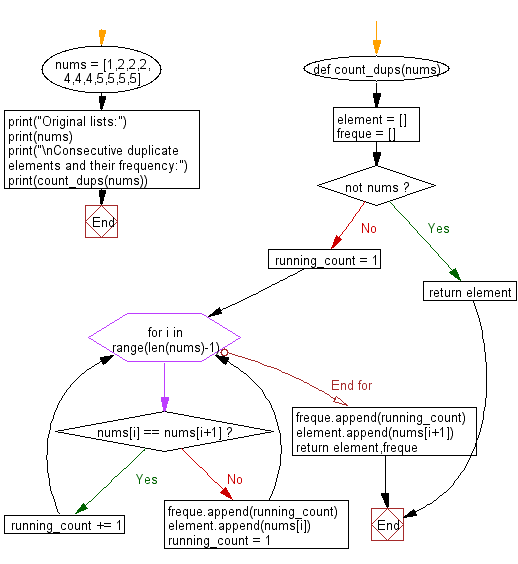Python: Count the frequency of consecutive duplicate elements in a given list of numbers
Frequency of Consecutive Duplicates
Write a Python program to count the frequency of consecutive duplicate elements in a given list of numbers.
Sample Solution:
Python Code:
# Define a function 'count_dups' that counts consecutive duplicate elements and their frequencies
def count_dups(nums):
# Initialize empty lists 'element' and 'freque' to store elements and their frequencies
element = []
freque = []
# Check if 'nums' list is empty, and return empty lists 'element' and 'freque' if so
if not nums:
return element
# Initialize a variable 'running_count' to track the frequency of consecutive elements
running_count = 1
# Iterate through the 'nums' list using a loop
for i in range(len(nums) - 1):
# Check if the current element is equal to the next element
if nums[i] == nums[i + 1]:
# If equal, increment 'running_count'
running_count += 1
else:
# If not equal, append 'running_count' to 'freque' and the current element to 'element'
freque.append(running_count)
element.append(nums[i])
# Reset 'running_count' to 1
running_count = 1
# Append the last 'running_count' and the last element to 'freque' and 'element'
freque.append(running_count)
element.append(nums[i + 1])
# Return both 'element' and 'freque' as a tuple
return element, freque
# Create a list 'nums' with consecutive duplicate elements
nums = [1, 2, 2, 2, 4, 4, 4, 5, 5, 5, 5]
# Print a message indicating the original list
print("Original list:")
# Print the contents of 'nums'
print(nums)
# Print a message indicating the operation to count consecutive duplicate elements and their frequencies
print("\nConsecutive duplicate elements and their frequency:")
# Call the 'count_dups' function with 'nums' and print the result
print(count_dups(nums))
Sample Output:
Original lists: [1, 2, 2, 2, 4, 4, 4, 5, 5, 5, 5] Consecutive duplicate elements and their frequency: ([1, 2, 4, 5], [1, 3, 3, 4])
Flowchart:

For more Practice: Solve these Related Problems:
- Write a Python program to count all duplicate elements in a list.
- Write a Python program to replace consecutive duplicates with their frequency.
- Write a Python program to split a list based on consecutive duplicates.
- Write a Python program to count streaks of identical elements.
Go to:
Previous: Write a Python program to count the same pair in three given lists.
Next: Write a Python program to find all index positions of the maximum and minimum values in a given list of numbers.
Python Code Editor:
What is the difficulty level of this exercise?
Test your Programming skills with w3resource's quiz.
